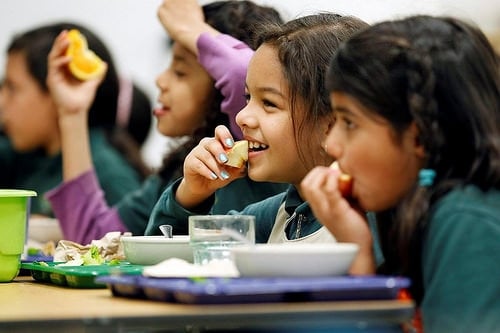WhyHunger is proud to join over 1,500 national, state and community-based organizations in signing onto the below statement opposing block granting for school meals. The statement, organized by our friends at FRAC (the Food, Research & Action Center), is an important step in protecting the health, food security and well-being of tens of millions of kids across the country.
The United States has a history of strong bipartisan commitment to support effective programs focused on school nutrition ensuring that children do not go hungry and are prepared to learn in the classroom. These vital programs are being targeted and are threatened under the guise of a three-state demonstration pilot project that would block grant important school meal programs. These programs have proven their effectiveness time and time again, and block granting them would remove the federal government’s important role in ensuring their implementation, protecting nutritional standards and even potentially limit their ability to increase funding in areas that show need. Giving states discretion on how to spend federal funds and set their own criteria for programs like School Breakfast, National School Lunch, Team Nutrition and the Special Milk program poses a threat to those families who are currently relying on these programs to keep their kids healthy and fed. Many low-income children stand to be left out of these vital programs as intended dollars can easily be diverted to other priorities of the state. For example, there is no requirement for running the programs year round or providing funding for more than one meal a day. Block granting is a bad idea and too ambiguous, leaving no mechanism for holding states accountable and ultimately undermining the proven effectiveness of these important nutrition programs.
Now is the time to take action! Please join FRAC and WhyHunger and commit to the fight against the flawed child nutrition reauthorization bill or H.R. 5003 – especially the block grant:
For organizations
Step 1: Sign the statement opposing the school meals block grant provision in the House CNR bill here.
Step 2: Use social media to help get the word out:
• Sample Tweet: Join [@your org hashtag] & over 1500 orgs opposing school meal block grant. Sign the statement today! //bit.ly/1XPG0OT #SaveSchoolMeals #CNR2016
For Individuals
Step 1: Check out FRAC’s Legislative Action Center for updates on CNR, advocacy tools, social media templates, and more.
Background (Provided by FRAC):
On May 18, the House Education and the Workforce Committee voted out the House Child Nutrition Reauthorization (CNR) bill, H.R. 5003, including a dangerous three-state block grant proposal for the school meal programs. This block grant would end the federal government’s ability to increase funding in areas of need, enforce child nutrition standards in school meals, and ensure students in need receive enough nutritious food year-round. Many other provisions of H.R. 5003 are also of serious concern, including a more difficult application process, harmful changes in community eligibility, and weakened school nutrition standards.
To learn more about the House CNR Bill and the block grant provision, read FRAC’s latest analysis of the bill.
___________
Opposition Statement to School Meal Block Grant Provision Included in “Improving Child Nutrition and Education Act of 2016 (H.R. 5003)
We write to express our strong opposition to the block grant provision included in the “Improving Child Nutrition and Education Act of 2016” (H.R. 5003), and we would oppose any proposal to block grant any child nutrition program. The highly effective child nutrition programs are designed to reduce hunger, improve health, and support learning. Block granting them is misguided and would diminish their ability to accomplish these fundamental goals.
The three-state block grant proposal included in the House bill would immediately cut the funding to operate the school nutrition programs in those states. It would eliminate the additional six-cent reimbursement that 98 percent of school districts receive for meeting the improved nutrition standards and the federal funding provided to support paid meals. After that cut, funding is capped at the fiscal year 2016 funding level. With each year, the programs’ ability to serve low-income children will erode even further as the states will no longer qualify for the annual funding adjustments that are based on food price inflation – resulting in fewer meals provided to fewer needy children. Additionally, this approach means that states will be unable to respond to any increase in need arising from a recession or population growth.
Furthermore, the meals would no longer have to meet consistent nutrition standards as they are only required to be “healthy.” This would create a patchwork of standards that seriously diminishes the school meals programs’ ability to promote good nutrition and improve child health outcomes and makes it difficult to procure the food needed. Participating states could set their own eligibility rules. Moreover, there would be no requirement that children have access to both school breakfast and lunch, and the U.S. Department of Agriculture would have minimal authority to ensure that the child nutrition funding that the states receive is being used to meet the nutritional needs of the children in the state.
The current structure of the child nutrition programs is based upon a shared, bipartisan commitment to provide children access to the nutritious meals they need in order to grow up healthy and achieve academically, and it allows the programs to respond to any increase in need. This commitment must be maintained. We urge you to reject any proposals to block grant the child nutrition programs.
Read and sign on here.



